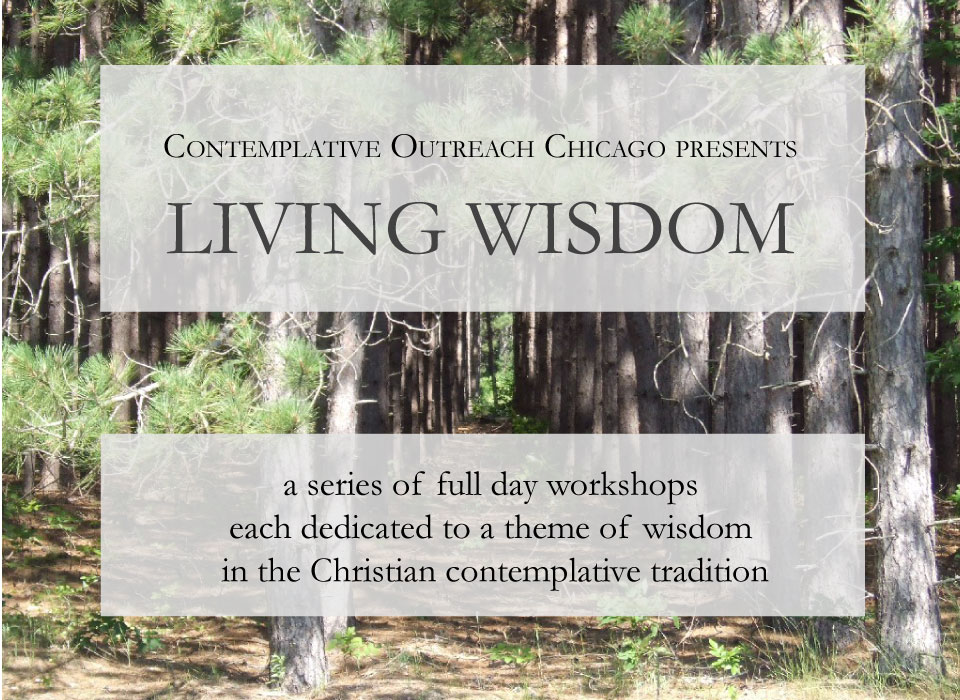
A new series of workshops in 2018 will continue our exploration of the Wisdom Tradition, in the lineage of Cynthia Bourgeault.
Contemplative Outreach Chicago presents a new series of three full day workshops, each dedicated to a theme of wisdom in the Christian contemplative tradition. The vision of this program is to deepen the contemplative wisdom in each participant. Based on the core practice of Centering Prayer, this program will increase awareness of and openness to the divine indwelling through additional practices which are founded in the Wisdom tradition.
Wisdom teaching builds on a strong foundation of traditional Christian mystical teaching and contemplative practice, approaching them through the contemporary lenses of mindfulness, nondual awakening, and interspiritual dialogue.
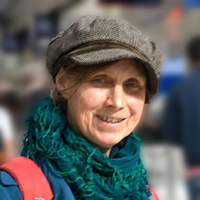
Wisdom describes a lineage of spiritual knowledge and practice that is principally concerned with transformation. It is not about knowing more, but about knowing more deeply, and can be recognized by an alert, present-moment awareness and a compassionate intelligence.
~ Cynthia Bourgeault
2018 LIVING WISDOM SERIES
The program consists of three Saturday workshops:
February 17: G.I. Gurdjieff and the Fourth Way, with David Orth
March 24: Spirituality from the Ground Up, with Jeff Ediger
April 14: Wisdom of the Gospel of Thomas, with Alan Krema
Location: St. Mark’s Lutheran Church, Mount Prospect, Illinois
Format: Each Saturday session will begin at 9:00am and end at 3:30pm. Lunch will be provided.
Registration: Register online below, or use this mail-in form.
Cost: $40 per workshop. (Scholarships available.)
Questions: Please send an email to get.info@centeringprayerchicago.org
Workshop Descriptions
G. I. Gurdjieff and the Fourth Way – February 17
Georges Ivanovitch Gurdjieff was the Greek-Armenian teacher who brought the enneagram to the attention of the West. More importantly he founded The Institute for the Harmonious Development of Man – known now as the Gurdjieff Work, the Fourth Way, or ‘work on oneself.’ Cynthia Bourgeault studied with this little known group for many years. What she learned there underpins much of her own vibrant, practical teaching.
This workshop will introduce the life and teaching of Gurdjieff, and how his “esoteric Christianity” reintroduces a large body of practical wisdom lost to the mainstream Christian West – wisdom useful to contemplative work – some would say essential. This wisdom tradition is difficult to understand, not only because of Gurdjieff’s innovative language and way of thinking, but because it is a multivalent “contemplative craft,” best learned in the context of a physical school or apprenticeship. With hope to impart an actual taste of his approach, there will be some experiential and practical work offered during this workshop.
Our guides for the day will be David Orth, Alan Krema, and Cynthia Bourgeault (via recorded video from her recent Wisdom Way of Knowing e-course).
We will also offer a practical guide in the work of conscious attention to aid in the experience of knowing as taught by these wisdom teachers.
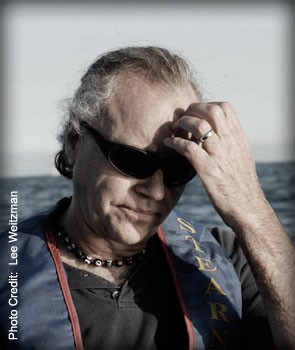 David Orth was a member of the Gurdjieff Foundation of Chicago for 10 years, served on the board for 5 years, and often led its practical work. He is a professional sculptor specializing in ceremonial objects for churches, synagogues, and personal use. He spent six years as an ER chaplain, has an MA in philosophy from Northwestern, and is a long-time member of St. Ann’s Episcopal Church in Woodstock, Illinois. www.OrthSculpture.com
David Orth was a member of the Gurdjieff Foundation of Chicago for 10 years, served on the board for 5 years, and often led its practical work. He is a professional sculptor specializing in ceremonial objects for churches, synagogues, and personal use. He spent six years as an ER chaplain, has an MA in philosophy from Northwestern, and is a long-time member of St. Ann’s Episcopal Church in Woodstock, Illinois. www.OrthSculpture.com
Spirituality from the Ground Up: The Hebraic Roots of the Wisdom Jesus – March 24
Who did the people who met Jesus say he was? Not a prophet, not a priest, but a teacher. More precisely, those who resonated with what he had to say thought of him as a moshel meshalim; that is, a wisdom teacher. But how did they come to this awareness? How did they know to give him this title? Because Jesus was not likely to have been the first sage they had encountered. In fact, there was a long-standing wisdom tradition in Israel. But not only in Israel. Many nations in the ancient world had wisdom traditions. And they borrowed from one another, thus indicating the deep roots of our emerging spirituality grounded in the concrete experience of being human rather than in abstract doctrines and creeds.
Much of the literature of this tradition, especially the book of Proverbs, focuses on the everyday, do-the-laundry level of life. But so, too, do the parables of Jesus! (We just tend to focus our attention solely on their transcendent level of meaning.) Yet this same doubling of significance — the correspondence between the concrete and the transcendent — may also be true for the proverbs and parables from this ancient wisdom tradition. And the fact is that both realms — the mundane and the transcendent — are part of what it means to be human. The challenge is to integrate these realms, discerning and amplifying meaning in the mundane, so as to become whole human beings. We can achieve a more well-rounded spirituality by becoming familiar with this ancient wisdom tradition out of which Jesus the Sage spoke.
Our approach will be participatory, integrating an introduction to this ancient tradition with our own gnosis (participatory knowing), recollected from experience. Taking selected proverbs from the book of Proverbs as our springboard, we will explore for each of the proverbs at least one of the following wisdom themes: work and sloth, friendship, and speaking and listening.
We will conclude the day with a consideration of that economic principle made available to us by life itself, whereby we are enabled to integrate laundry-level with contemplative wisdom, so as to achieve success in the task of becoming whole human beings. (Hint: This economy has everything to do with the fundamental principle of Hermetic spirituality: “As above, so below.”)
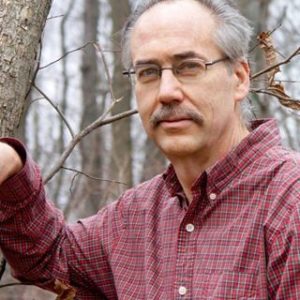 Jeff Ediger first discovered the Hebraic Wisdom Tradition in a high school “Great Books” club where, among other classic texts, he was introduced to the book of Ecclesiastes. His fascination with this and other biblical wisdom writings became an integral part of his undergraduate major in “Therapeutic Communication.” After several years of work in mental health counseling, he returned to school to pursue doctoral studies in Communication. His discovery that the “listening heart” was the essence of what Solomon had asked for when he asked God for wisdom then informed his choice of listening as the topic for his doctoral thesis. But when his commitment to “transformational learning” (a wisdom-grounded perspective) proved incompatible with the goals of conventional higher education, life directed him away from a teaching career towards work as a craftsman in architectural restoration. Jeff received his doctorate in the Phenomenology of Communication from the University of Illinois and did postdoctoral studies in the Divinity School at the University of Chicago. He has taught at St. Olaf College, the Graduate School of Wheaton College, and North Park Seminary. He has also taught introductory courses on the Hebraic Wisdom Tradition in a number of church contexts throughout the Chicagoland area.
Jeff Ediger first discovered the Hebraic Wisdom Tradition in a high school “Great Books” club where, among other classic texts, he was introduced to the book of Ecclesiastes. His fascination with this and other biblical wisdom writings became an integral part of his undergraduate major in “Therapeutic Communication.” After several years of work in mental health counseling, he returned to school to pursue doctoral studies in Communication. His discovery that the “listening heart” was the essence of what Solomon had asked for when he asked God for wisdom then informed his choice of listening as the topic for his doctoral thesis. But when his commitment to “transformational learning” (a wisdom-grounded perspective) proved incompatible with the goals of conventional higher education, life directed him away from a teaching career towards work as a craftsman in architectural restoration. Jeff received his doctorate in the Phenomenology of Communication from the University of Illinois and did postdoctoral studies in the Divinity School at the University of Chicago. He has taught at St. Olaf College, the Graduate School of Wheaton College, and North Park Seminary. He has also taught introductory courses on the Hebraic Wisdom Tradition in a number of church contexts throughout the Chicagoland area.
The Wisdom of the Thomas Gospel – April 14
The Gospel of Thomas is a manuscript containing a collection of sayings of Jesus that was discovered among a cache of ancient manuscripts at Nag Hammadi in Egypt in 1945. It has often suffered from “guilt by association,” dismissed as a Gnostic text simply because it was found with other Gnostic texts. In fact, though, scholars are in general agreement that it is a legitimate text that is consistent with the canonical gospels. It may actually be the oldest known record of the sayings of Jesus!
The Thomas Gospel is a compilation of 114 sayings attributed to Jesus (called logoi, “words”), similar to the logoi in the book of Proverbs, that are not arranged in any chronological or topical order. Some of the sayings closely parallel sayings that appear in the Gospels, some are similar, and nearly half appear nowhere in Scripture.
The logia can be used to lead us into a way of knowing the teaching of Jesus as a path to follow and a work to do. This is the inner work of the Christian wisdom tradition. In the words of Cynthia Bourgeault, “What is Jesus teaching? I would say he’s teaching a radically kenotic path (the path of self-emptying). Kenosis in service of singleness, and singleness in service of compassion manifest. i.e., the kingdom of heaven. Three core tenets of Jesus path are: Kenosis, Abundance, and Singleness.”
We will explore kenosis from St. Paul’s description of Jesus in Philippians 2:6-8: “Though his state was that of God, yet he did not claim equality with God something he should cling to. Rather he emptied himself (kenosis), taking the form of a slave, he was born in human likeness.”
We will use some of Cynthia’s teaching from the newly published Introductory Wisdom School ecourse and explore how these sayings can help us with our inner work of knowing ourselves.
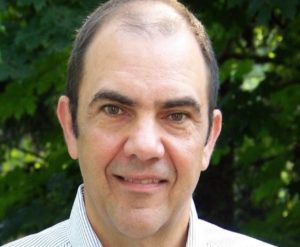 Alan Krema is a Wisdom student with Cynthia Bourgeault and is a staff facilitator at larger Wisdom Schools. He has completed the Living School program at the Center for Action and Contemplation. He is a long time practitioner of centering prayer, a certified presenter of centering prayer, and a facilitator of several centering prayer groups. Alan currently serves as chapter coordinator
Alan Krema is a Wisdom student with Cynthia Bourgeault and is a staff facilitator at larger Wisdom Schools. He has completed the Living School program at the Center for Action and Contemplation. He is a long time practitioner of centering prayer, a certified presenter of centering prayer, and a facilitator of several centering prayer groups. Alan currently serves as chapter coordinator
Registration
You are invited to register now for one, two, or all three workshops at $40 each. (It will also be possible to register at the door for the workshops, if space for additional participants is available.)
For secure online registration, please fill in the information requested below. Use the “comment” box to let us know about special dietary needs or other requests. If you prefer, you may use this mail-in registration form. Please note that the final day to register is the Wednesday before each Saturday session.
Bookings
Bookings are closed for this event.